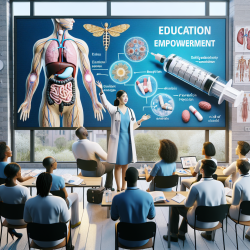Telepsychiatry is a rapidly growing field that bridges the gap in mental healthcare access. As a practitioner, it's crucial to develop specific competencies to deliver effective care through this medium. A recent study titled Defining competencies for the practice of telepsychiatry through an assessment of resident learning needs provides valuable insights into the skills required for successful telepsychiatry practice. Here's a breakdown of the key competencies and how you can improve your telepsychiatry skills.
Key Competencies for Telepsychiatry
The study identified several essential domains of competency for telepsychiatry:
- Technical Skills: Mastering the use of telepsychiatry equipment and software, including troubleshooting technical issues.
- Assessment Skills: Adapting traditional psychiatric assessments to the telepsychiatry context, such as conducting mental status exams via video.
- Relational Skills and Communication: Building therapeutic alliances and effectively communicating with patients and their families through video.
- Collaborative and Interprofessional Skills: Working with other healthcare providers remotely to ensure continuity of care.
- Administrative Skills: Understanding the administrative aspects of telepsychiatry, including scheduling and documentation.
- Medico-Legal Skills: Adhering to legal and regulatory standards in a telepsychiatry setting.
- Community Psychiatry and Cultural Competence: Being aware of the social determinants of health and cultural factors that affect patient care.
- Knowledge of Health Systems: Using telepsychiatry to address systemic healthcare inequities.
Practical Steps to Enhance Your Telepsychiatry Skills
Here are some actionable steps you can take to improve your telepsychiatry practice:
- Engage in Hands-On Learning: Participate in telepsychiatry sessions under the supervision of experienced practitioners to gain practical experience.
- Attend Workshops and Seminars: Enroll in telepsychiatry training programs that offer both didactic and experiential learning opportunities.
- Utilize Simulation Training: Use simulation exercises to practice telepsychiatry scenarios, focusing on technical, assessment, and communication skills.
- Seek Feedback: Regularly seek feedback from mentors and peers to identify areas for improvement and refine your skills.
- Stay Updated: Keep abreast of the latest guidelines and best practices in telepsychiatry by following reputable sources and participating in professional forums.
Why These Competencies Matter
Developing these competencies is crucial for several reasons:
- Improved Patient Care: Effective telepsychiatry can provide timely and high-quality mental healthcare to underserved populations.
- Professional Growth: Acquiring these skills enhances your professional competence and opens up new career opportunities.
- Systemic Impact: Telepsychiatry can help address healthcare disparities by making mental health services more accessible.
By focusing on these competencies, you can ensure that your telepsychiatry practice is both effective and compassionate, meeting the needs of your patients while adhering to the highest standards of care.
To read the original research paper, please follow this link: Defining competencies for the practice of telepsychiatry through an assessment of resident learning needs.










